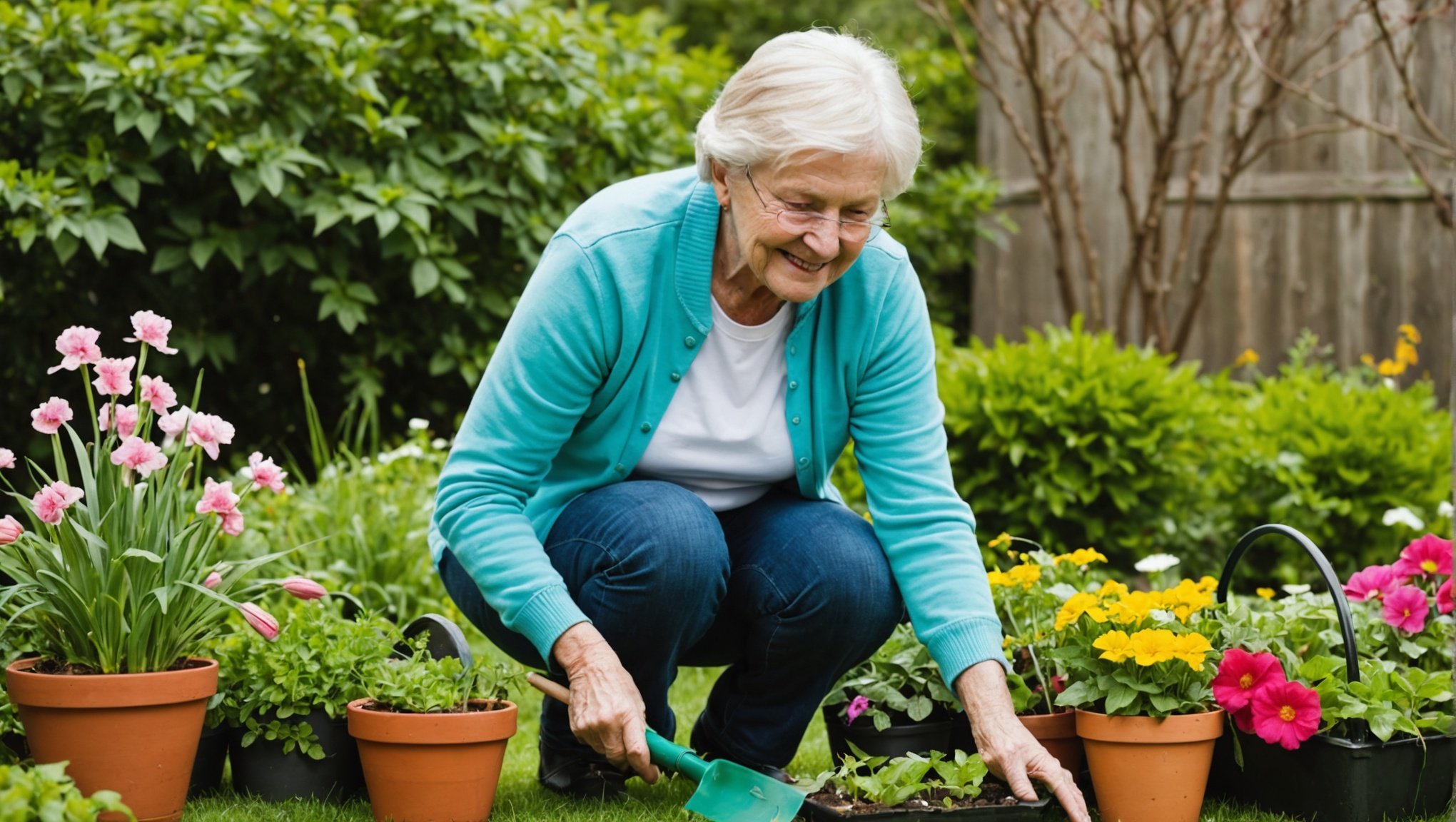Gardening is a fulfilling passion for many seniors, but joint pain can hinder their enjoyment. Fortunately, there are smart strategies to cultivate a vibrant garden while keeping joints safe. By incorporating proper techniques, ergonomic tools, and beneficial exercises, seniors can thrive in their gardening pursuits. This guide offers innovative approaches to minimize strain, ensuring that gardening remains an enriching experience, not a painful chore. Get ready to nurture both your garden and your well-being!
Importance of Joint Health in Gardening for Seniors
Gardening is a beloved activity among seniors, but it can present challenges for joint health. As we age, common joint issues such as arthritis, stiffness, and inflammation become more prevalent. These conditions can make gardening tasks, like digging or pruning, more difficult and sometimes painful. However, maintaining good joint care is essential to continue enjoying this fulfilling hobby.
Also to see : Top Eye Care Strategies for Seniors Over 80 to Combat Dry Eyes Effectively
The impact of gardening on joint health is twofold. On one hand, it provides gentle exercise, which can help keep joints flexible and muscles strong. On the other hand, repetitive motions and heavy lifting can exacerbate existing joint problems if not managed properly. Therefore, it's crucial for seniors to adopt strategies that support joint care while gardening.
Benefits of maintaining joint health extend beyond the garden. Keeping joints healthy can improve overall mobility, reduce pain, and enhance quality of life. For seniors who love gardening, focusing on joint care ensures they can continue to engage in their passion safely and comfortably. Using tools designed to reduce strain, taking regular breaks, and performing joint-friendly exercises can all contribute to a more enjoyable gardening experience. By prioritising joint health, seniors can cultivate not only their gardens but also their well-being.
Have you seen this : Top Conflict Resolution Techniques Tailored for Seniors Living in Assisted Care Facilities
Ergonomic Gardening Techniques
Gardening can be a soothing activity for seniors, but it's essential to incorporate ergonomic gardening techniques to protect joint health. Using tools and methods designed with ergonomics in mind can significantly reduce strain and discomfort.
Ergonomic Tools and Their Benefits
Ergonomic gardening tools are crafted to reduce stress on joints. They often feature cushioned grips and longer handles, allowing gardeners to maintain a more natural posture. These tools help in minimizing the bending and twisting motions that can exacerbate joint pain. For instance, using a long-handled trowel can prevent excessive bending, while a lightweight pruner can ease the strain on hands and wrists.
Techniques for Minimizing Strain
Incorporating specific gardening techniques can further enhance joint protection. For example, raised garden beds reduce the need for bending, making planting and weeding more accessible. Rotating tasks frequently can also prevent overuse of any particular joint, allowing different muscle groups to share the workload.
Importance of Posture and Body Mechanics
Maintaining proper posture and body mechanics is crucial. Bending at the knees instead of the waist and keeping the back straight can prevent unnecessary strain. Additionally, taking breaks and stretching during gardening sessions can help maintain flexibility and reduce the risk of injury. By focusing on these ergonomic practices, seniors can enjoy gardening while safeguarding their joint health.
Adaptive Gardening Tools for Seniors
Exploring the realm of adaptive gardening tools can transform the gardening experience for seniors, making it both enjoyable and manageable. These tools are specifically designed to accommodate the unique needs of senior gardeners, enhancing comfort and reducing strain.
Essential Tools for Easier Gardening
Several adaptive gardening tools are essential for seniors aiming to protect their joint health. Tools like lightweight pruners, long-handled trowels, and ergonomic weeding tools can significantly ease the gardening process. These tools often feature adjustable handles and cushioned grips to provide optimal comfort and efficiency.
Selecting the Right Tools
Choosing the right gardening equipment involves considering individual needs and limitations. Seniors should opt for tools that cater to their specific joint concerns, such as tools with extended handles to avoid bending or those with rotating handles to reduce wrist strain. It's crucial to test the tools for grip comfort and weight before purchasing.
Innovations in Gardening Tools for Seniors
Recent innovations in senior gardening equipment have introduced features like telescopic handles and battery-powered options, which further alleviate physical exertion. These advancements ensure that seniors can continue gardening with minimal discomfort, allowing them to focus on the joy of cultivating their gardens.
Recommended Plants for Joint-Friendly Gardening
Gardening can be a rewarding activity, especially when choosing suitable plants that require minimal physical effort. Selecting the right gardening choices can significantly reduce strain on joints, allowing seniors to enjoy their hobby without discomfort.
Types of Plants for Low Physical Effort
Opt for easy maintenance plants that thrive with minimal intervention. Perennials like lavender, daylilies, and hostas are excellent choices as they return each year with little upkeep. Herbs such as thyme and chives are also hardy and require minimal watering and pruning.
Companion Planting for Easier Management
Companion planting involves growing plants together that benefit each other, reducing the need for extensive care. For instance, marigolds can deter pests when planted alongside vegetables, reducing the need for physical pest control. This method not only simplifies garden management but also enhances plant health and yield.
Seasonal Considerations
When planning a joint-friendly garden, consider seasonal gardening choices. Opt for plants that thrive in your local climate to minimise the need for extra care. For example, native plants are adapted to local conditions and often require less watering and fertilisation. By choosing plants wisely, seniors can maintain a beautiful garden with ease, safeguarding their joint health.
Exercises to Enhance Joint Flexibility and Strength
Engaging in regular joint exercises is crucial for seniors to maintain flexibility and support their gardening activities. Incorporating simple exercises into daily routines can significantly enhance joint health and overall senior fitness.
Simple Exercises for Home
Seniors can perform various exercises at home to improve joint flexibility and strength. These include:
- Ankle Circles: Sit comfortably and rotate each ankle in circles to enhance mobility.
- Wrist Flexors: Extend your arm, palm facing up, and gently pull back your fingers using the other hand to stretch the wrist.
- Knee Lifts: While seated, lift each knee towards the chest to strengthen the lower body.
Importance of Warm-Up and Cool-Down
Warming up before and cooling down after exercises is essential to prevent injury. A warm-up increases blood flow to muscles, while a cool-down helps in gradually reducing heart rate. Gentle stretches or a short walk can effectively serve these purposes.
Supporting Gardening Activities
Regular exercise not only boosts joint flexibility but also enhances endurance, making gardening tasks more manageable. Strengthened muscles can better support joints, reducing the risk of strain during activities like digging or lifting. By integrating these exercises, seniors can enjoy gardening with improved mobility and reduced discomfort.
Creating Accessible Garden Spaces
Designing an accessible garden is crucial for seniors, particularly those using wheelchairs or walkers. A well-planned garden ensures that everyone can enjoy the therapeutic benefits of gardening. Garden design should prioritise wide pathways that accommodate mobility aids, allowing safe and easy navigation. Smooth, non-slip surfaces are recommended to prevent accidents.
Raised beds are a valuable feature in accessible gardens. They reduce the need for bending, making gardening tasks more comfortable and less strenuous for seniors. Raised beds can be adjusted to a suitable height, allowing gardeners to tend to plants while seated, which is beneficial for those with limited mobility. These beds also improve soil drainage and extend the growing season by warming the soil earlier in spring.
Incorporating pathways and seating into garden layouts enhances accessibility and comfort. Pathways should be well-defined and provide direct routes to different garden areas. Strategic placement of seating areas allows gardeners to rest and enjoy their surroundings without exertion. Benches or chairs with back support offer additional comfort. By focusing on these elements, seniors can maintain their passion for gardening while ensuring their environment is safe and accessible.
Nutrition for Joint Health
Maintaining proper nutrition plays a vital role in supporting joint health for seniors, especially those who enjoy gardening. Consuming a balanced diet rich in anti-inflammatory foods can help reduce joint pain and stiffness. Foods like fatty fish (salmon, mackerel), rich in omega-3 fatty acids, are known for their anti-inflammatory properties. Similarly, nuts, seeds, and olive oil can contribute to joint health by reducing inflammation.
Incorporating fruits and vegetables high in antioxidants, such as berries, spinach, and kale, can further support joint function. These foods help combat oxidative stress, which can exacerbate joint issues.
Hydration is equally crucial for maintaining joint health while gardening. Staying well-hydrated ensures that joints remain lubricated, reducing the risk of stiffness and discomfort during physical activities. Seniors should aim to drink plenty of water throughout the day, especially when spending time outdoors.
In addition to a nutritious diet, certain supplements may support joint health. Glucosamine and chondroitin are popular supplements that some people find beneficial for joint pain relief. Omega-3 supplements can also be considered for those who do not consume enough through diet. Consulting with a healthcare professional before starting any supplement regimen is advisable.
Inspiring Stories from Seniors in Gardening
Gardening is more than just a hobby for many seniors; it is a source of joy and wellness. Gardening testimonials reveal how seniors find purpose and satisfaction in cultivating their gardens. For instance, Mary, a 75-year-old avid gardener, shares how tending to her flowers daily has improved her mental well-being, providing a sense of accomplishment and peace.
Community Gardening Initiatives
Community gardening initiatives have become a lifeline for seniors, offering both a social outlet and a chance to engage in fulfilling activities. These gardens foster a sense of belonging and community spirit. Seniors like John, who participates in a local community garden, find joy in sharing gardening tips and stories with fellow enthusiasts, creating bonds that extend beyond the garden.
Mental Well-Being Through Gardening
Gardening significantly contributes to mental well-being. The act of nurturing plants and witnessing their growth can be therapeutic. Seniors often report feeling more relaxed and content after spending time in their gardens. This activity not only alleviates stress but also enhances mood and cognitive function, making it a valuable pursuit for mental health.
Safety Tips for Seniors While Gardening
Ensuring gardening safety is crucial for seniors to enjoy their hobby without risk. Understanding common gardening injuries and how to prevent them can make a significant difference in maintaining a safe gardening experience.
Common Injuries and Prevention
Seniors often face injuries such as back strains, cuts, and falls while gardening. To avoid these, it's essential to use proper tools and techniques. Ensure tools are sharp to reduce the effort needed and wear gloves to protect against cuts. Always keep pathways clear to prevent tripping and use kneeling pads to reduce strain on knees.
Moderation is Key
Engaging in gardening in moderation is vital. Overexertion can lead to fatigue and increase the risk of injury. It's important for seniors to pace themselves, taking regular breaks to rest and hydrate. This approach not only prevents injuries but also makes gardening more enjoyable.
Weather Considerations
Extreme weather can pose additional risks. During hot weather, gardening should be done in the early morning or late afternoon to avoid heat exhaustion. In cooler conditions, dressing in layers helps maintain body temperature. Always stay informed about weather forecasts to plan gardening activities safely.
Resources for Seniors in Gardening
Accessing the right gardening resources can greatly enhance the experience for senior gardeners. These resources provide essential support and foster a sense of community among enthusiasts.
Local Organizations and Programs
Many local community programs offer tailored support for senior gardeners. These initiatives often include workshops, gardening clubs, and social events, creating opportunities for seniors to connect and share their passion. Community centres and local councils frequently organise such programs, providing a space for seniors to learn and grow together.
Online Resources and Forums
The internet is a valuable tool for accessing gardening advice and connecting with fellow gardeners. Numerous online forums and websites are dedicated to sharing tips and experiences, offering a wealth of information at your fingertips. These platforms allow seniors to ask questions, share successes, and find inspiration from a global community of gardeners.
Workshops and Classes Tailored for Seniors
Workshops and classes specifically designed for seniors can be found through local gardening centres and educational institutions. These sessions focus on senior-friendly techniques and offer hands-on experience under expert guidance. Participating in these classes not only enhances gardening skills but also encourages social interaction, making the gardening journey more enjoyable and fulfilling.











